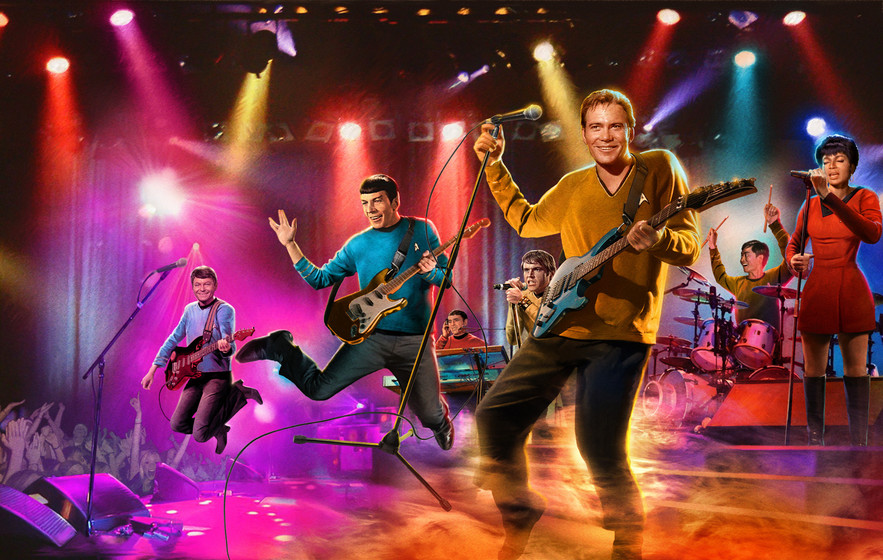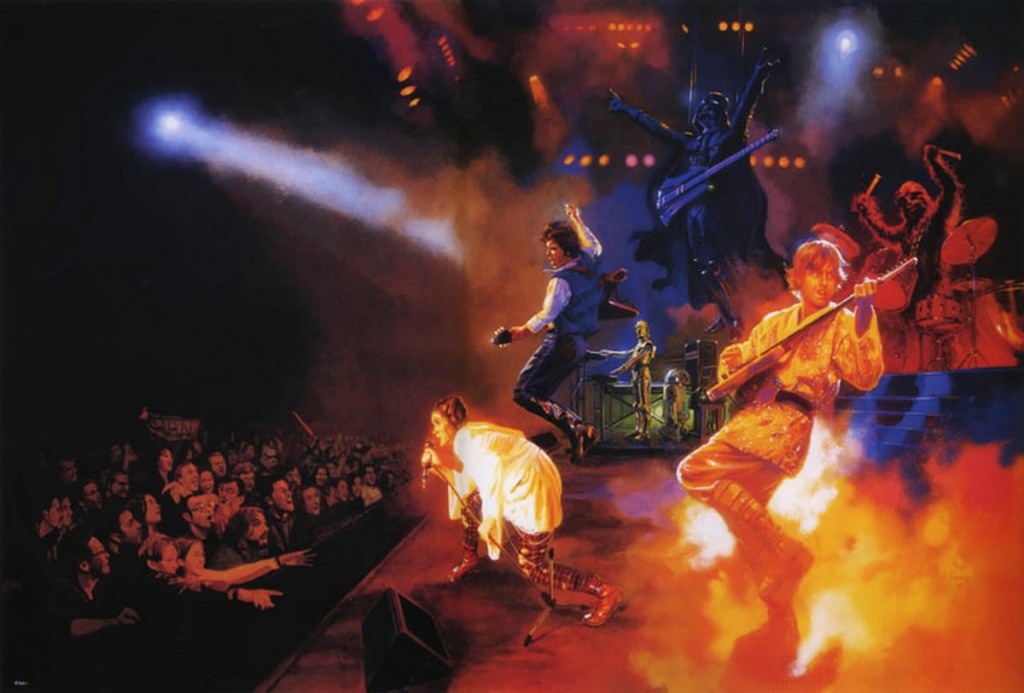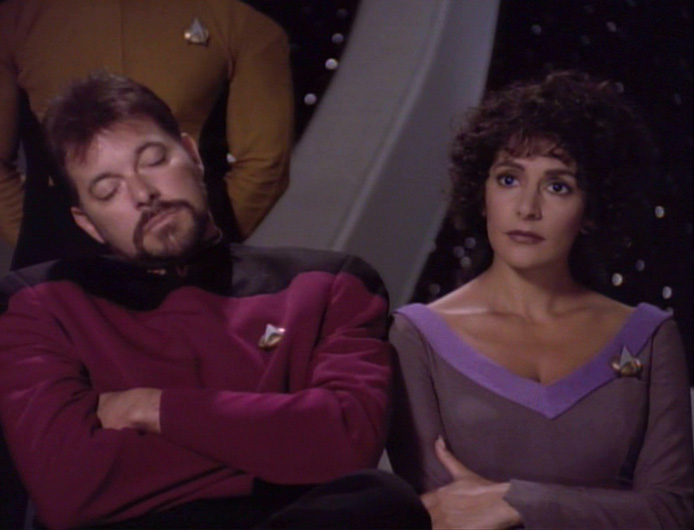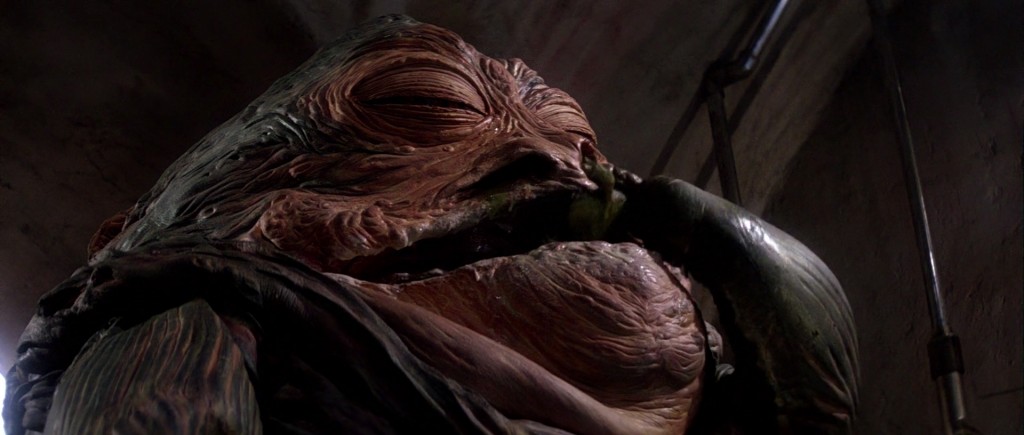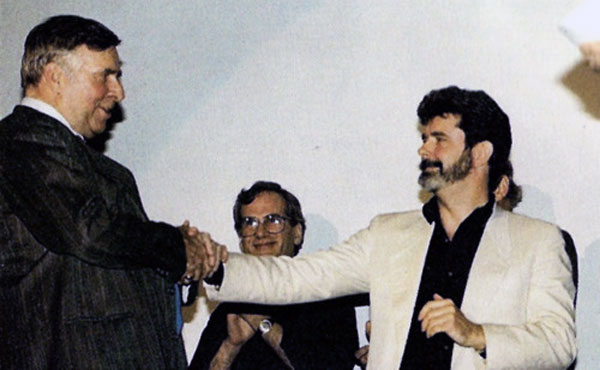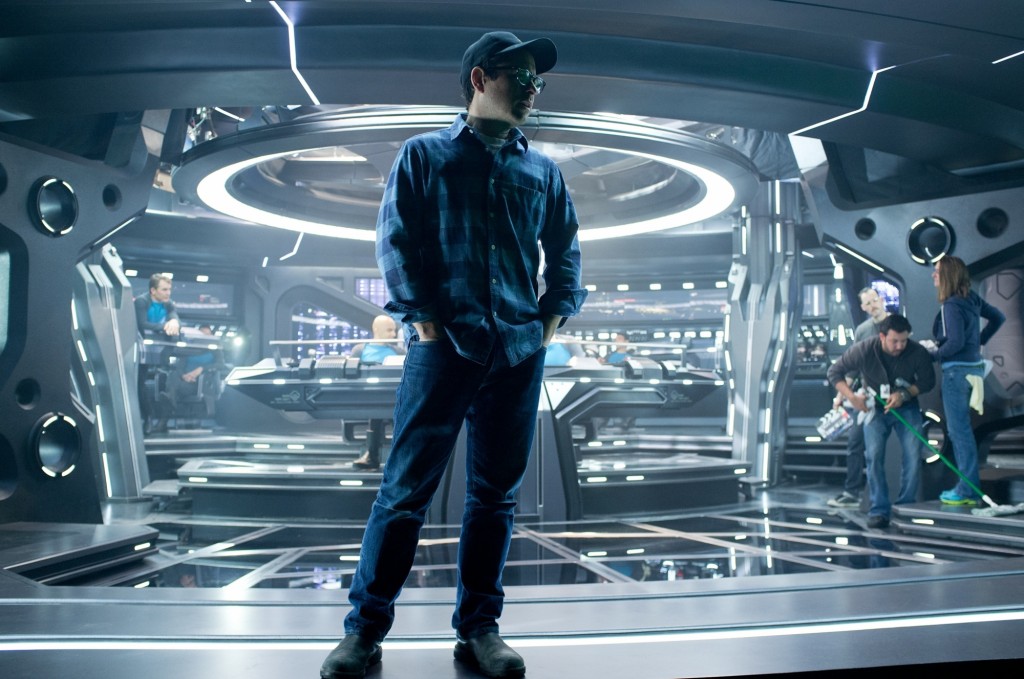Star Trek is an enormous and complex cultural entity whose impact on politics, technology, and storytelling are undeniable. It’s also as flawed and problematic as any other massive media franchise. Lifelong Trekkie and Deadshirt Editor-in-Chief Dylan Roth attempts to make sense of it all for die-hards and outsiders alike in his bi-weekly column: Infinite Diversity.
“Could you please continue the petty bickering? I find it most intriguing.”
– Lt. Commander Data (“Haven” [TNG])
At first glance, a rivalry between Star Trek and Star Wars seems like the most natural thing in the world. Here we have two popular media entities with similar names, both with the relative novelty of being set in space, emerging less than a generation apart and both enduring into the 21st century. Non-fans (and even fans, when they’re exhausted or drunk) sometimes confuse the two, saying one when they mean the other, or honestly can’t tell the difference. Both of them fall under the umbrella of “geek culture,” which may be more or less meaningless now, but certainly meant something to the kids and teens of the 1970s and 80s who got their asses kicked for being a part of it. There’s also a great deal of crossover in the two fanbases, which naturally leads to more conversation comparing the two entities.
But in actuality, Star Trek and Star Wars have very little in common. Star Trek is born from television, a space adaptation of Westerns, designed to tell short, small-scale morality plays about peace and acceptance. Star Wars is primarily a film series, inspired by sensational Flash Gordon film serials, but is essentially a classic sword and sorcery story set in space instead of a quasi-Medieval Europe. Comparing Star Trek and Star Wars isn’t like comparing DC and Marvel, or The Beatles and the Stones. Those are ultimately too similar. A couple weeks ago on Twitter, I made that same mistake, saying that Star Wars was the Bon Jovi to Trek‘s Springsteen, but my friends rightfully pointed out that was way too harsh on Star Wars, and implied that Wars was a pale Trek imitation, when that really couldn’t be further from the truth. The most apt analogy I’ve been able to come up with is Star Trek is to Star Wars as Bruce Springsteen is to KISS.
Although they’re both rock bands who got their start in the 1970s and continue to fill arenas and stadiums today, Springsteen and KISS are not acts you’d normally think to compare. They play very different brands of rock, both big and bold and epic but in very different ways. One is deep and thought-provoking, the other is flashy and fun. They suit different moods, different mindsets. The things that make a good Bruce song are not the same things that make a good KISS song. They really shouldn’t be compared to one another, and neither should Star Trek and Star Wars, for all of the same reasons. To begin with…
Star Trek is not about fun.
Or at least, “fun” isn’t an essential element of Star Trek. There’s lots of fun to be found in Star Trek. The Original Series has a great sense of humor about itself, and the interactions between Kirk, Spock, and McCoy will often bring a smile to your face. One of the most famous episodes in the series, “The Trouble With Tribbles,” is essentially an absurd comedy revolving around headless, limbless bunnies that won’t stop breeding, creating a crisis that the crew must solve while chuckling over how surreal their problem is. Most of the films have a spring in their step, a chuckle or a thrill here and there to break up the fairly serious action or dilemma. The spin-offs have their fun episodes, too, but by and large they are not as good at it.
The point is that while Star Trek can be fun, a Star Trek story that isn’t fun per se can still be a very successful Star Trek story, in fact many of the best ones are sort of a bummer. The feeling that fans enjoy getting out of Star Trek is more akin to a full meal, vegetables and all. Star Trek is best when it’s making you think more than when it’s trying to get your heart racing. At its best, Star Trek has plenty of heart to balance out its head (balancing head and heart is in fact one of the primary themes of The Original Series) but most of the time Trek, particularly the Next Generation era, is kind of dry.
It’s only now, in J.J. Abrams’ rebooted Star Trek film series, that Trek has made an effort to be more of a fast-paced, high-flying adventure, and that’s probably because Abrams, while not particularly attached to Trek, is an enormous Star Wars fan, and injected a ton of Star Wars-style energy into his films. In doing so, however, Abrams sacrificed a lot of the cerebral substance that Trek fans crave. That’s why while Star Trek (2009) is a much more fun and probably better overall movie than its sequel, Star Trek Into Darkness, Into Darkness is better at being a Star Trek movie, because it had a complex, twisty-turny plot and served as a heavy-handed allegory about some contemporary political issues like terrorism and drone strikes.
Trek fans don’t complain when a Star Trek story doesn’t have enough action, explosions, or humor, they complain when there’s not enough politics, or science, or philosophy. Sure, we like action and explosions, but we don’t need to have them. That’s what Star Wars is for.
Star Wars is not about brains.
And that’s not to say that Star Wars is stupid. It’s just that being smart is not essential to making Star Wars good. The original Star Wars trilogy has lots of snappy dialogue and some interesting themes that bear close examination, but in the end it’s a basic “good vs. evil” story, a fairy tale that you can understand fully when you see it for the first time as a child. Star Wars is about adventure, about high drama and big spectacle. It’s not always about laughs or emotional highs–The Empire Strikes Back is the favorite of a large percentage of Star Wars fans and that movie gets soul-crushingly dark, but it’s still a pretty simple story with pretty clear lines between right and wrong. Like with any great film, there are ideas to examine and discuss, but Star Wars is not an intellectual exercise. That, I would argue, is part of the appeal. It’s not heavy lifting, it’s a good time.
Star Wars fans don’t complain when a Star Wars movie doesn’t have enough politics, science, or philosophy, quite the opposite, in fact. The Star Wars prequels had many failings, but among fans’ biggest pet peeves were the attempt to scientifically explain The Force (which had previously been basically magic and there’s nothing wrong with that) and the addition of long, boring scenes taking place in the Galactic Senate in which humans and aliens argue about trade agreements. These are not things that make for good Star Wars.
By comparison, Trekkies live for that shit. We want a scientific explanation for everything, even if the “science” we get from our tech manuals is utter nonsense, and if there’s one thing we love, it’s a bunch of stiff diplomats arguing around a conference table. Star Wars fans would complain if a film was released in which there were no exciting action sequences or battles, and rightfully so, because the title of the movie is Star Wars. For that same reason, this is not a problem we’re ever likely to run into.
It’s not that Star Wars movies shouldn’t have complex plots or contemporary political allegory, it’s just not the series’ strong suit. There may yet be a Star Wars movie in our future that’s as brainy as it is exciting, but if that complexity comes at the expense of thrills, then that’s not good Star Wars.
So why the rivalry?
From my limited perspective as a die-hard Trekkie and a casual Star Wars fan, it seems to me that this rivalry is mostly a one-way thing. Many Star Trek fans resent the mainstream appeal and financial and critical success of the Star Wars franchise. Star Wars, however nerdy it may be, has always been and likely will always be cooler than Star Trek in the eyes of the public at large, and be enjoyed by a larger group of people. You can make a Star Wars reference in everyday in conversation and are far less likely to be judged or get the side-eye than if you start talking about Star Trek, and you’re far more likely to be understood.
Star Wars fans have no reason to be defensive toward Trekkies, because they’re the “cool kids.” (In a very, very relative sense.) If Star Trek had never happened, Star Wars would likely have gone on anyway, with relatively few changes. George Lucas admits that Trek helped pave the way for his work, and producer Gary Kurtz confirms that the series was an influence on Star Wars, but really Star Wars was based on Flash Gordon, which predates Trek by decades. In the development of Star Wars, Trek is pretty inconsequential.
Star Trek, however, owes its life to Star Wars twice over. In 1977, after seven years in cancellation building a following in reruns, Star Trek was finally set to return to television as Star Trek: Phase II, a new series featuring most of the same cast and crew as the original. Pre-production had just gotten underway when Star Wars was released in theaters and became the biggest surprise smash hit in cinematic history. With the market primed for more space opera, Paramount decided Star Trek should make the leap to the big screen and production was rushed on Star Trek: The Motion Picture, which led to the successful film series, which led to a return to television with a new cast, which led to three TV spin-offs and more movies, etc. etc. Trek‘s resurgence in the eighties and dominance in the nineties would have been unlikely without the success of Star Wars, especially given that A) the Paramount TV network that was meant to launch with Phase II wouldn’t happen until 1995, and B) Phase II looks like it would probably have been awful.
And when the flame of Trek blew out again in 2005, it was once again Star Wars that came to its rescue, in a manner of speaking. While Star Wars was taking a much-needed breather in the wake of the prequels, Paramount decided to take a chance on rebooting the Star Trek film series. The director they chose for this mission was J.J. Abrams, who didn’t really care much for Trek but was a die-hard Star Wars fan, and was able to breathe new life into Trek by basically remaking it into Star Wars. Mainstream interest in Star Trek increased greatly. Shortly thereafter, Disney purchased Star Wars from Lucasfilm with the intention of making more films, and who did they get to direct their first attempt but J.J. Abrams, who they figured would make an excellent Star Wars film because he’s basically made one already.
My feeling is that a combination of jealousy and pride is what makes Trek fans more likely to grumble about Star Wars than the other way around. Many Trekkies just can’t wrap their heads around why the thing they love can’t get the same kind of mass recognition as Star Wars, while others insist that the reason is that Trekkies are just smarter than most people, and that the general public is too dense to understand Trek so they flock to the more digestible Star Wars instead. If any animosity exists among Star Wars fans toward Trekkies, that’s where it comes from: the snobbery of Trek fans who think they’re above other people, Star Wars fans in particular.
The Star Trek/Star Wars debate will likely go on forever in one form or another, as we all know nerds love to compare and rank things. What’s important is that hostility between the fanbases, which again, overlap a great deal, is kept to a minimum, especially given that the two film series will be running concurrently again beginning next year. Now that the two are more similar than ever, even sharing a guiding creative force in J.J. Abrams, there will be increased temptation to pit these two franchises against each other. Fans must resist the temptation to get bitter, particularly if the next Trek bombs without Abrams behind the wheel. (There’s the potential for another X-Men: The Last Stand scenario here.)
The important thing to remember is that Star Trek and Star Wars are two different things, and that it is 100% okay to like them both, or one more than the other, or to love one and dislike the other, or to enjoy neither. (Infinite Diversity from Infinite Combinations, everybody.) If you like Star Trek but think Star Wars is shallow and juvenile, you’re not entirely wrong, but that doesn’t mean Star Trek is objectively better. If you like Star Wars and you think Star Trek is stiff and pretentious, nobody can argue with you, but that doesn’t mean it sucks. Star Trek and Star Wars can absolutely be a personal thing for you, but it’s not something you should judge another person for liking. Watch and enjoy. Or don’t watch. I cannot recommend watching and not enjoying, though. That’s the one we should be trying to stay away from.
PS: Because I love to stretch an analogy, Original Battlestar Galactica is Queen, New Battlestar Galactica is Muse. Good day and LLAP.
Infinite Diversity will return in two weeks! Follow @DeadshirtDotNet on Twitter to keep up with what’s new here on Deadshirt, and feel free to tweet @DylanRoth with suggestions for future topics for Infinite Diversity, or just to talk about Trek. He truly never gets tired of that.

